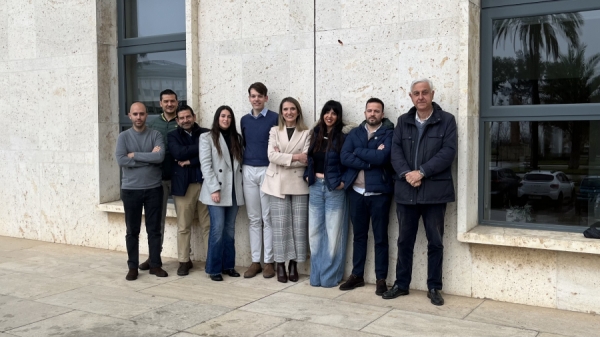Five research groups from the Higher Technical School of Agricultural and Forestry Engineering (ETSIAM) at the University of Córdoba have joined forces to boost the digital transformation of the Andalusian agri-food sector through the European project Andalucía Agrotech EDIH. The project is coordinated by the Ministry of Agriculture, Fisheries, Water and Rural Development of the Andalusian Regional Government and led at the University of Córdoba by Professor Rosa Gallardo.
The digitalization of the agri-food sector is already a reality, contributing to increased competitiveness and economic, social, and environmental sustainability. However, the digital transformation process can be challenging and requires training, experience, and an initial investment that businesses are not always able to make.
“When we talk about digital transformation, we’re fundamentally talking about opportunities—but it’s also a complex process in which agri-food companies, especially SMEs, face various barriers that hinder the adoption of innovations,” explains Francisco López, a researcher on the project at the University of Córdoba. That’s why the project offers training and advice to Andalusian agri-food SMEs, aiming to ensure that the integration of digital innovations translates into success stories that drive further technological development and increase sector confidence in digital solutions.
“Agri-food companies are interconnected. If one company adopts a digital innovation and it works, it generates interest among others that share similar needs. Success stories have a powerful ripple effect,” López adds.
The project is designed so that companies themselves can request digital innovation services from the partners involved, including the University of Córdoba. This way, the university provides the sector with access to infrastructure equipped with various digital technologies. This includes the Rabanales Experimental
Farm, and other labs or equipment such as UAV flight platforms, NIRS instrumentation, hyperspectral cameras, and more. It also includes the expertise of researchers from different fields.
These services are free for beneficiary SMEs and can be combined. “Ideally, we tailor our support to each company’s needs, accompanying them through their digital transformation process, and integrating different types of services if needed,” says López.
In fact, it is common for demonstrations, courses, and living labs to spark the interest of participating companies, which can lead to new initiatives and requests within the scope of the project. These may include innovation testing through proof-of-concept trials or support in securing external funding to bring a project to market.
Key Initiatives: Demonstrations, Hands-On Workshops, Courses, and Living Labs
Andalucía Agrotech EDIH offers two types of services: those aimed at a single SME, and those from which multiple SMEs can benefit. Among the latter are the hands-on workshops and demonstrations led by the University of Córdoba, focused on various technologies. For many companies, these are their first exposure to current digital solutions.
Short courses have also been created for situations that require a deeper understanding of different digital innovations. One of the most successful has been “Use of Drones in Agriculture,” which has trained more than 50 professionals across two sessions on how to process drone-captured images to analyze and obtain crop condition data.
These services are particularly useful in helping companies become familiar with different technologies, allowing them to identify the ones that best suit their needs. “The goal,” López emphasizes, “is for end users to become aware of the wide range of existing technological alternatives and their capacity to meet specific needs.”
This results in improved decision-making regarding technology adoption. “The challenge is to develop digital innovations that meet the sector’s demands—and to ensure that end users are aware of the broad range of solutions and how to implement them,” he adds.
Living labs are another key initiative of the project. These are digital innovation spaces where different companies collaborate to identify needs, and define and test potential digital solutions to challenges proposed by the university. Outcomes include concrete recommendations for technology use and stronger ties between the university and agri-food companies, as well as among the companies themselves.
Through Andalucía Agrotech EDIH, the University of Córdoba is tackling digitalization challenges, evaluating and testing a wide array of innovations, and training professionals in various technologies. With this project, it is also trying to connect companies from different backgrounds both with each other and with the university to foster digital innovation in the Andalusian agri-food sector and to promote its adoption by SMEs.
The project involves the participation of the following research groups: Remote Sensing and Precision Agriculture (AGR-124), Mechanization and Rural Technology (AGR-126.), Agricultural Production Systems Engineering (AGR-128), Agricultural Hydrology and Hydraulics (AGR-127), and Agricultural Economics (SEJ-109).
This report is included in the activities carried out in the project "Desarrollo de redes de asesoramiento y gestión de proyectos europeos I+D+i en la UCO" with acronym "DevelOPE", within the framework of grant GPE2023-001243-P financed by MICIU/AEI/10.13039/50110001103.


